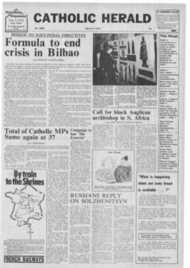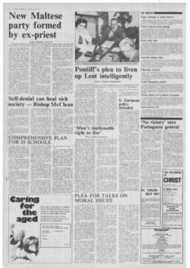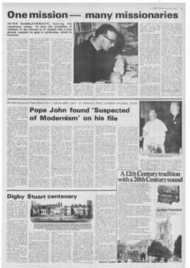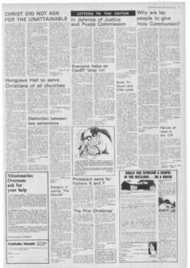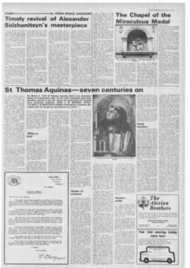Page 3, 8th March 1974
Page 3
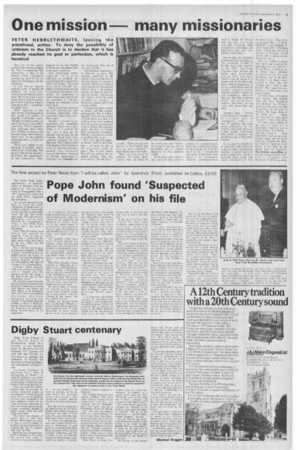
Report an error
Noticed an error on this page?If you've noticed an error in this article please click here to report it.
Tags
Share
Related articles
When Pope John Was An Easy-going Sergeant
Spiritual Head Of 550,000,000 Catholics
A Bridge Between East And West
The Stop-gap Pope Who Revolutionised The Church
Inv The Steps Of Pope Pius X
Pope John found 'Suspected of Modernism' on his file
The final extract by Peter Nolan from "I will be called John" by Lawrence Elliott, published by Collins, £3.50
The future Pope John's appointment as apostolic visitor to Bulgaria after his important international work for Propaganda Fide in 1925 suggested to some that the Holy Office suspected his orthodoxy.
Sure enough when he became Pope he found the words "Suspected of Modernism" inscribed on his file, based solely on correspondence with a priist friend who was later excommunicated. "His anger erupted. Demanding a pen he wrotc beneath the condemnatory words, 'I, John XXIII, Pope, declare that I was never a Modernist."
Later when his natural good humour had returned, he observed: "I am the living example that a priest who has been placed under observation by the Holy Office can still become Pope."
But in the ten years he spent ministering to Bulgaria's 50,000 Catholics, Archbishop Roncalli helped convert the hostile attitude of the majority Bulgarian Eastern Orthodox Church to one of friendliness. He began by visiting all his scattered flock.
Lawrence Elliott observed: "Not in six centuries had Rome sent to enquire after this isolated handful who clung to the faith in the face of their neighbours' scorn."
He obtained money from the Vatican and from friends to help Bulgarian refugees then coming from Greece and Serbia and later victims of an earthquake there. The Church was regarded as a foreign missionary institution directed from abroad, so Archbishop Roncalli worked to have a Bulgarian bishop administrator appointed and Bulgarian run seminaries. Rome ignored many of his suggestions. At a retreat in 1926. Pope John recorded that his ministry had brought many trials but "these are not caused by the Bulgarians for whom I work, but by the central organs of ecclesiastical administration. This is a form of mortification and humiliation that I did not expect and which hurts me deeply."
The apostolic visitor made many friends among the orthodox clergy and laity and eight years after he had left a cardinal visiting Bulgaria recalled a shop-keeper, recognising his clerical habit. rushed out and asked: "How is our 111011signor — you know, the round one?"
Pope John extended a warm welcome to Bulgarians of all faiths to call on him if in Rome. Once spotting a Bulgarian general, who was a friend of his at the 1960 Olympics, he asked him to the Vatican. The general later told his fellow Communist officers they had merely reminisced over old times.
Yet shortly after the soldier had returned to Sofia, it was learned that a Catholic bishop and a dozen priests, long imprisoned by the regime. had been quietly released.
During the Second World War, as Apostolic Delegate in Turkey, Pope John is reputed to have saved the lives of many thousands of Jews. Chaim Barlas of the Jewish Agency's Rescue Committee, who sought the delegate's help. wrote of him: "Much blood and ink have been spilled in the Jewish tragedy of those years, but to the few heroic deeds which were performed to rescue Jews belong the activities Of the apostolic delegate. Mgr. Roncalli. who worked indefatigably on their behalf."
In February 1944, Pius XII made more than 3100.000 available to the Jewish Council of Rumania. This was in response to a plea made by• Archbishop Roncalli, who had been approached by Chief Rabbi Herzog of Jerusalem to help Jews endangered by the retreating German troops
I listorian Theodore Lavi said: "This interest manifested by the Vatican at this grave juncture was an important factor which contributed to the rescue of Rumanian jews. Their moral power of resistance grew when they saw that they were not abandoned to their fate". It was Archbishop Roncalli's influence which helped influence King Boris of Bulgaria against implementing Hitler's policy there.
It was Pope John who had the reference to "perfidious Jews and infidels" removed from the Good Friday prayers. When one Cardinal later celebrating the liturgy in the Pope's presence slipped into the old reference from force of habit. John stopped him on the spot and said: "Say it over — the new way."
At the age of 63 Pope John received the first really prestigious appointment of his career so far — he was made Nuncio in Paris. He quickly won the difficult General de Gaulle's respect with his sympathy for French national feeling after the liberation of France from the Nazis.
Once at his palace in Paris he heard a carpenter working in the building let loose a stream of colourful blasphemies. audible in his study. As the man kept going on, he finally marched out to confront him. "What is all this, my good man?" he said, earnestly. "Why can't you just say merde like everyone else and get on with your work?"
His home became a favourite gathering place "for the leaders of European politics. the diplomatic corps, members of the cabinet. visiting dignitaries." The) came mainly for his company. Robert Schuman, who became French Premier in 1947, observed: "He is the only man on Paris in whose company one feels the physical sensation of peace."
In Paris Pope John took special care to develop cordial relationships with the Russian Ambassador and made his first call to the Soviet embassy. When Kruschev tendered good wishes through his embassy for the Pope's 80th birthday. the Pope ignored aides who urged him to ignore it and promptly responded to thank him, adding: "I will pray for the people of Russia."
This reply is believed to have led to Soviet permission being granted to two Russian Orthodox pi-rests to attend the Vatican Council as observers. His biographer said: "John had given his assurance that an attack on the Communist system was not on the council agenda, and Kruschev, having perhaps puzzled over what to make of a Roman churchman who did not parade his anti-Communism like a battle flag, decided to trust him."
One of the stories told about Pope John's period as Nuncio in Paris, recounts that as he and the Chief Rz..bhi of the city were in conversation. both approached a dining-room door together. The rabbi said: "After you, Excellency." Pope John replied: "No, no. the Old Testament before the New."
Cardinal Roncalli's very first decision when he was elected Pope — "I will he called John" — was a departure from tradition. This had been the title chosen by one of the anti-popes of the 15th century. Pope Paul was the first Cardinal he created and the significance of this was not lost on Vatican observers. He was seen to he choosing a
successor.
One of the new Pope's first moves in 195/3 was to reform some of the exaggerated tradition that clung to the papacy. He ended the tradition of eating alone all the time and stopped people dropping to their knees when they came into his presence. His predessor had the garden cleared of gardeners and the cupola of St. Peter's, overlooking the gardens. emptied of tourists.
Alarmed monsignori tried to prevent him casually strolling into the gardens because people and tourists would see him. He calmed them down. "Don't worry about it. i promise not to do anything that would scandalise them." It was in conversation with a gardener that he discovered the rock bottom level of Vatican wages and had them immediate]) raised. Pope John's idea for calling a council he himself described as coming quite unexpectedly. "Suddenly an inspiration sprang up within us as a flower that
blooms in an unexpected sprJrigtime. Our soul was illuminated
by a great idea . . a word. solemn and binding, rose to our lips. Our voice expressed it for the first time — a council."
The compassion and warm humanity that characterised Pope John radiates from almost every page of Lawrence Elliott's biography, a phenomenon made even more credible by the fact that the author is not a Catholic.
blog comments powered by Disqus


